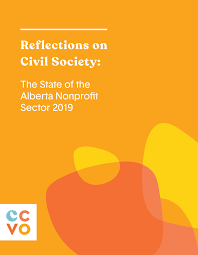- Home
- About Us
- The Team / Contact Us
- Books and Resources
- Privacy Policy
- Nonprofit Employer of Choice Award

 Taking the Temperature
Taking the Temperature
When nonprofit leaders across Alberta were asked in our focus groups and interviews about the current mood of the sector, the responses could be best characterized as one of low optimism. The reasons attributed to this general sense relate to financial uncertainty and were compounded by the fact that the majority of our survey respondents (56%) had little or no confidence that they would be invited by the new provincial government to engage in meaningful discussions on issues that impact their organizations.
Shifting Context, Shifting Mood
While many issues identified this year and in previous reports continue to remain relevant, the context in which we now find ourselves has shifted significantly. In their provincial election platform, Alberta’s now-governing United Conservative Party (UCP) included a section dedicated to “harnessing the power of civil society.” The section states that “one of the first principles of conservatism is that civil society should come before government and that voluntary groups are generally more effective in preventing and reducing social problems than a big bureaucratic state.”
Nonprofit leaders voiced concerns that the above statement could be used to justify further offloading of responsibilities to the nonprofit sector without adequate resources to meet the needs of the community. This concern was coupled with nonprofit leaders’ reaction to a new provincial government that is focused on reducing the cost of public services. The reality is that when the doors to provincially funded programs and services begin to close through budget cuts, it is the individuals and families living in communities who feel it most. While not all nonprofits in Alberta receive funding from the provincial government, provincial budget decisions impact the sector as a whole. As fewer public programs and services become available to evergrowing demands, people turn to nonprofit organizations with the hopes that they will help address unmet needs. " Another discomfort expressed by nonprofit leaders relates to the oversimplified framing of the role and functions of nonprofits as basic interactions between neighbours helping neighbours i.e. “…poorly-resourced community groups simply trying to help their neighbours,” as stated in the UCP platform.6
The lack of appreciation for the diversity and sophistication of the sector has the potential to undermine the resources required to safely and effectively deliver the thousands of nonprofit programs and services in Alberta by assuming that the work can be fulfilled by volunteers or inadequately resourced community groups.
Down But Not Out
While the general level of optimism among nonprofit leaders has declined from last year, there is confidence in the sector’s overall ability to address its challenges. They report that despite political and economic uncertainties, now is the time to be assertive – to step up and speak out. As the political and economic contexts shift, the mission of each nonprofit organization continues to evolve.
While it is important to work collaboratively across sectors to achieve positive results, nonprofit organizations need to set their own agendas and priorities to move their missions forward and to bring others along when possible. A stronger and bolder nonprofit sector promotes the inclusion of diverse voices, connects people across divisions, and ultimately strengthens our communities.
To read the full report, click here.
CCVO (Calgary Chamber of Voluntary Organizations) is a member-based charitable organization that was established in 2004 to strengthen Calgary’s vibrant nonprofit/voluntary sector, and address sector-related public policy issues in Alberta. The high quality of life enjoyed in our communities is built on many of the programs, activities, and services run by more than 26,000 nonprofits and charities that make up Alberta’s nonprofit sector. We are proud to support these organizations through our sector research, advocacy, and informed convening and programming activities.